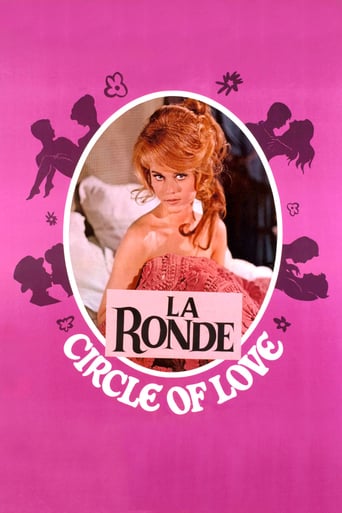kekseksa
If nothing else, Vadim had plenty of brass neck and he needs it all here in remaking one of the great classics by one of the greatest of all directors, Max Ophüls.With some inevitability the Vadim film really only serves to point up how wonderful the Ophüls film is. Vadim and Ophüls are of course chalk and cheese. The latter was the great genuine master of the ellipsis (as opposed to Lubitsch who faked it) and could make something elegant out of the most sordid realities; Vadim on the other hand could have made a concert of baroque music seem vulgar and rendered a vicarage tea-party pornographic.Schnitzler's play, controversial when it appeared, is cynical and sordid in many ways (and quite intentionally so) but in the hands of Ophüls it becomes something of remarkable beauty without any loss of its satirical effect. Both in structure (the reflexive frame with an Anton Walbrook on the top of his form directing the symbolic roundabout - the original sense of the play's title - Der Reigen)and in substance (even at their most debased, his lovers have a certain innocence and a certain charm), the 1950 film delights at every turn. The 1964 film makes one feel a bit queasy, as Vadim transforms Schnitzeler's material into something resembling primeval slime.The contrast I expected but I did not imagine it would be quite so marked and it is almost shocking to observe how the same material can produce such vastly different results and induce such vastly different reactions.This is not to decry Vadim whose importance during these years is undeniable and who, in his better films, pushed forward the barriers of what could be said and shown in films in important ways and whose work, although always a shade dubious (that inescapable vulgarity) has often survived better than one might have supposed. Et Dieu créa la femme, the film that made his (and Bardot's) name and gave him the license for everything he did later, still has a zest and energy that is breath-taking, Barbarella, which I once thought would simply appear silly in years to come, surprises me every time I watch it by how enjoyable it remains and how excellent some of the ideas still appear.Vulgarity where it is combined with a real sense of fun is, to my mind, always excusable and sometimes a real if slightly guilty pleasure. One might think of Lubitsch, of early DeMille, of Dino Risi, of spaghetti westerns and gialli.... but this, on the other hand is quite simply a film that should never have made, one for which Vadim's special but strictly limited talent was insufficient qualification. After the lame 1941 remake of Dr. Jekyll and Mr. Hyde, Fredric March, who had starred in the superb Mamoulian version of 1931, supposedly telegraphed Spencer Tracy (star of the duff version) to thank him for having so greatly (but unintentionally) enhanced his (March's) reputation as an actor. Had Ophüls still been alive in 1964, he could (and probably would) have thanked Vadim in much the same spirit.
moonspinner55
Second adaptation of Arthur Schnitzler's play "Reigen", first filmed by director Max Ophüls in 1950 as "La Ronde", gets the Roger Vadim treatment, which is to say it is most certainly a sumptuous display but one with nothing happening beyond the pretty window dressing. Time and place have been changed from the original version--we are now in 1913 Paris instead of 1900 Vienna--but the story is the same: a prostitute offers herself to soldier who resembles the only man she ever loved; the soldier goes on to seduce a housemaid, who in turn makes love with the son of her employer. Vadim and scenarist Jean Anouilh have eliminated the Raconteur (a fatal mistake), and so we are set adrift amidst well-upholstered sets and superbly dressed and coiffed ladies, lost among the vapid players, dull romantic talk and teasing glimpses of flesh. Jane Fonda lets her bare back steal her bed scenes. The dazzling opening credits sequence and Michel Magne's lovely background score are assets, as is Henri Decaë's rich color cinematography. *1/2 from ****
Charlot47
Updates the 1950 masterpiece to Paris in 1914, shot in rich colour with evocative music, dance and song. A witty script from Jean Anouilh travels through the emotions lightly and, this being France, has slightly weightier moments of literature and philosophy. Since the men are close to being caricature lovers from a sex farce, which some of the time this is, the film belongs to the women. And what a wonderful collection of beautiful, sexy, so often poignant women! Top billing probably has to go to a gorgeous Jane Fonda, then the lover of the director and later his wife, as a young bourgeois wife. But several others play her close: Anna Karina as the housemaid Rose, Catherine Spaak as the mystery girl, Francine Bergé as the actress Maximilienne, and Marie Dubois as the soft-hearted Breton tart. All good roles, taken with gusto and a joy to watch.
shepardjessica-1
The version I saw was dubbed which didn't help matters any. Not Vadim's best stuff, but the women are beautiful. Anna Karina is touching and naive, a young Jane Fonda is gorgeous and amusing, and many others. Francoise Dorleac was supposed to have a small part in this, but I didn't see her. Vadim did much better work with Brigitte Bardot.A 3 out of 10. Best performance = Jane Fonda. She was never lovelier than this time period. The men are all buffoons or chauvinist pigs, but the girls make it barely watchable. As I said, the original, in French, may be more enjoyable. Jane Fonda has her "own" voice, but she may be the only one in the dubbed version.


